- Home
- Annette Blair
Jacob's Return Page 2
Jacob's Return Read online
Page 2
“Big girl,” Emma said, to get her share of attention, and Jacob fancied he could hear Simon’s teeth gnashing.
He lifted Aaron, straightened his tiny frock coat, a miniature of every man’s, and turned to his brother. “Have you met my children, Simon?”
“What need? They are English.”
“They are Amish, like their father,” Jacob said softly.
The sound of whispers grew, then hushed. People returned to their seats. Rachel’s father, the Bishop, was waiting to begin the last sermon of the day.
A half hour into it, Jacob looked up as if summoned, and saw his father walk in. So white his beard had gone, so many new wrinkles etched his beloved face. It was difficult for Jacob to keep from rushing forth to greet him after so long. And when their gazes locked, Datt’s eyes filled.
Bishop Zook saw the exchange. He looked from father to son and stopped speaking. Other than the sound of Jacob’s own heart, silence held. No one so much as shuffled a foot or cleared a throat. Even the little ones seemed to sense the moment.
When Jacob raised his chin and looked into the Bishop’s eyes, they were cold, piercing. On this man’s whim, he and his children would be welcomed or banished.
“You are back, Jacob Sauder,” the Bishop said.
‘For my children,’ Jacob wanted to clarify, ‘not for me,’ but he dared not. “I am back, Bishop Zook.”
The Bishop rocked on his heels, his face stern. “You … ah … consigned us all to … warmer climates, when last we met.”
Jacob’s collar got tight. He resisted an urge to wipe his palms on his pants.
The Bishop indicated those in attendance. “None of us went.”
Jacob didn’t think he should smile. He didn’t think the Bishop had a sense of humor.
Their highest spiritual leader looked him over as if he were a fly in his cracker pudding, then he nodded thoughtfully. “You either, I am surprised to see.”
But the Bishop was wrong; Jacob had been to hell and back.
Bishop Zook examined the congregation at large for a full minute, then he turned back to the rotten-apple, fly-in-the-pudding prodigal and regarded him so long, Jacob began to understand the word, eternity.
Then the Bishop nodded, as if he was listening to a voice only he could hear. “Jacob Sauder,” he said like a judge passing sentence. “In the name of God, welcome home.”
Jacob expelled the breath choking him and swallowed, but not fast enough to stifle his sob.
From the women, came a sniffle or two. From the men, throat clearing, coughs, a grunt.
Datt’s tears streamed into his beard.
The Bishop raised his hands for quiet. “Let our fellowship meal today be one of great rejoicing, for Jacob Sauder has returned to us.”
Jacob caught Simon’s stunned, but swiftly-banked, expression. They stared at each other. This should have been his day. The Bishop should have invited rejoicing over Simon’s ordination. But Jacob’s return had overshadowed Simon’s glory.
An ordination was a once-in-a-lifetime event, one experienced by a select few. An event Jacob was certain defined, for Simon, his status as chosen by God. And it was shelved to make way for the return of a worthless sinner.
Even to the sinner, this did not seem fair.
As people made their way toward the fellowship meal, Jacob embraced his father. “Ah, Datt.” He stepped back and cleared his throat. “You have grandbabies,” he said as Rache approached. “Emma, Aaron, here is your Grossdaudy.”
Levi laughed as he took one in each arm. Emma called him, Daudy, and when he kissed her forehead, she pushed his beard aside, and scratched her face.
Jacob smiled at Rachel. “Thanks, Mudpie, for watching them.”
Simon bristled. “My wife’s name is Rachel!”
Jacob raised a brow to make light of Simon’s ire and remove the sting of it for Datt and Rachel. “To me, she will always be Mudpie. Ever since she made me schnitz pies of mud.” Jacob examined her face — a little more lined, a lot more dear. “Remember? Three years old, you were, I think. I had just lost Anna, and I was lonely. I had never seen you before, but when I asked your name, you replied, ‘Mudpie,’ while offering one of your creations. They didn’t taste so good, Rache.”
Her look softened. “I didn’t think a smart five-year-old would be so foolish as to taste one, Jacob.”
“I did it to make you smile,” he said, wishing he understood why she’d turned from him. “Such was always my desire.” He yanked one of her kapp ribbons to prove it.
The sadness in her maple-syrup eyes lightened. “Welcome home, Jacob.”
And Jacob felt his stone heart crack.
Simon, the new deacon, the son who stayed to work the farm and care for their father, left the Yoder house alone.
Jacob slapped his father’s back. “Let’s go congratulate Simon.”
* * * *
On the way home from service, Rachel saw a yellow warbler sitting atop a thorn apple bush. Usually, she cherished such beauty. Usually, Gadfly’s proud, head-up gait caused a rocking motion that soothed her, but just now it only added to her unease.
She’d been furious when she saw Jacob, as furious as she was elated, bless and plague him, both. And the same to her own heart for betraying her. Elated, indeed.
Why, oh why, had he left her? And why now had he returned?
Yes, plague him and Simon, too. As angry as she was with Jacob — as she had a right to be — as much as she wanted to berate him for his unexplained departure, she would never have done so publicly. Urging the district to shun Jacob was cruel, even for Simon.
But it would not go well for her if she said so.
Rachel took a deep breath and opened her senses to the morning mist over fresh-turned fields, the canopy of new-leafed maples, and the earthy scent of horse and leather. But she would not be calmed, for the silence of the bitter man beside her taunted her. “How could you condemn your brother before everyone?”
Simon’s narrow-eyed gaze caught Rachel like a bug on fly-paper. Dismay froze her, her heart quickening under his scrutiny … until she realized he would not show anger toward her today, not with any outward display. Because the people who would come to welcome Jacob home would see, and Simon could not bear that. Words he would use, but words of the mouth did not hurt, not like the lack of heart words hurt, and between she and her husband, there had been no words of the heart for some time.
“Jacob deserves shunning,” he said, finally. “He married English.”
“His marrying English would be wrong, only if he had been baptized Amish, Simon, you know that. Besides it’s the Bishop who should decide his fate.”
“I’ll be Bishop one day.”
“You cannot know you will become Bishop. My father is young, yet.” Later, Simon would punish her for speaking her mind like this, but she was too upset to care right now. She raised her chin. “You sound as if you have pride in your calling to the church.”
Fury burned in her husband’s look. Pride was a serious sin. “Mind your tongue, woman. I am a plain and humble man … plainer and humbler than most. ’Tis not proud to know God’s will.”
“Perhaps it is His will, then, that we have no children.”
“How dare you! ’Tis His plan that we bring forth children. And your punishment, your fault, His making you barren. ’T’will continue until you repent … you with your brazen hair and—”
“I cannot change my hair, Simon. And it’s covered decently by my prayer kapp. No one sees it but you, as is a husband’s right. I am sorry the sight repels you.” Sometimes Simon could make her feel as if she was shrinking where she sat, and if she wasn’t, she probably should, to save the world from the sight of her.
“’Tis not just your hair repels me, and you know it.”
“I am the way God made me,” Rachel said, smaller still.
“With your frivolous play, it’s a wonder the Elders let you teach their children. Such laughter we hear coming from the school
house. I do not approve. There are others, I think, who do not wish to offend me by taking your position away. If you would give me children, you could leave teaching and save the church leaders the embarrassment of replacing you.”
“If you would visit the school, Simon, I am certain I would remember not to laugh.” Rachel bit her lip in regret for her rash words, but Simon was too intent on his driving to notice her slip.
He tugged Gadfly’s reins and skirted a rut. “And that newspaper. Your pride in it will destroy your soul.”
Rachel sighed. After she’d published her first newspaper and saw the good she could do, it gave her purpose. Her people needed her newspaper. Even if they were too stubborn to step foot in the English doctor’s office or call him to their homes, they read his column. Little Jake Hertzer would have choked to death, if not for Doctor Sam’s advice in the Amish Chalkboard. That should be proof enough.
So if satisfaction was akin to pride, then yes, she felt it. She would not give up the Amish Chalkboard. No, nor her plan to purchase Old Atlee Eicher’s printing press, though, heaven help her, Simon did not know about that.
As for being barren, her heart cried at not having little ones. But her barrenness, her newspaper, her teaching, these were old arguments, ones she could not bear to have today. Not when her heart and mind were so filled with Jacob’s return.
“We are coming to the farm,” Simon said. “We will speak of this later, in private.”
“I know,” Rachel said.
Chapter 2
Jacob had returned.
Rachel was glad. Simon was not. But Simon was rarely glad about anything. And because of that, Rachel’s happiness was fleeting.
But now, as she rocked Emma and Aaron to sleep, their little faces warm against her neck, she was happier than she’d been since Jacob left.
Jacob was home. And he brought his babies.
Emma, tiny and dark haired, weighed no more than a thistle. Aaron, also dark-haired, felt larger and heavier. When he’d awakened during service, Rachel saw his smiling eyes and had an urge to offer him a mudpie. Both children bore their father’s dimples.
Jacob and Simon resembled each other in looks too, but not in manner. Hair, dark and curling, eyes the color of an overcast sky, labeled them Sauders. Jacob’s features were chiseled and square, Simon’s less sharp. Her lanky husband stood taller by an inch, but Jacob had a broader, sturdier build, hard-muscled and whipcord strong.
Jacob smiled often. Simon did not.
Rachel sighed over the fact and gazed about the room she’d prepared. The cribs were ready and waiting. Jacob’s bed, she’d spread with his Mom’s memory quilt, a welcome-home burst of color in blues, purples, maroons and blacks.
Jacob’s mother, Hannah, after her parents’ deaths, had cut their clothes into squares to make that quilt. Hannah said she would touch the squares as she drifted to sleep at night. The twill reminded her of her mother bent over a washtub, the soft sateen of Sundays and her mother climbing into the buggy in anticipation of fellowship and prayer. The plain blue weave came from her father’s shirts, the black serge, his broadfalls, making Hannah remember him behind a plow and six Belgian horses.
Hannah’s mother had made Hannah good memories.
Hannah made Simon and Jacob good memories.
Now, Rachel hoped she would have the opportunity to make good memories for Emma and Aaron. She would enjoy them while she could, whatever time brought. Except, she never wanted to let them go. She kissed Emma’s bare head and rested her cheek on Aaron’s. Then she saw Jacob in the doorway and her heart trebled.
He stopped at the foot of the bed and ran his hand over the quilt. And despite her anger, Rachel’s heart opened to him. “I miss her too,” she said. “She would be so happy you’re raising your babies here. How she would love them.”
Jacob was not surprised to hear Rachel echo his thoughts so well, not after he had read her that way at service.
He stopped before her, to devour the sight of her sitting there holding his sleeping children, wishing he understood the emotion she hid from him. He did not know, for the life of him, why she might be angry with him, when it was she who had—
“I couldn’t put them down,” she said, her blackberry curls escaping the sides of her kapp. And, without thought, Jacob bent on one knee to tuck the curls in. Though the touch nearly seared him, he memorized the silk of her with his fingertips and wished — oh, how he wished — that she hadn’t turned from him, that they had married as they planned and the twins were theirs, that she would slip beneath Mom’s quilt with him and—
“A pretty picture.” Simon’s words brought Jacob up, certain, from his brother’s look, Simon knew what he’d been thinking.
Jacob took Emma and Aaron from Rachel then, and put them in their cribs. He couldn’t watch as she followed her husband to their room.
He’d heard their arguing ever since.
Trying to ignore their angry voices, Jacob rubbed the back of his neck. Lord, if he returned only to bring Rachel grief, what would he do?
Buy a farm of his own and move out of here, that’s what he’d do. But not so far that his babies couldn’t have Rachel’s love or his Datt’s. Not that far.
He and Datt had made a fuss over Simon’s ordination after service. But Simon resented the tardiness of it almost as much as he resented Jacob’s ill-timed return.
After that, for the rest of the day, Simon tensed every time Rachel touched his children, and Lord, she couldn’t get enough of them.
When Jacob could stand the angry sounds from their bedroom no more, he went down to the porch to get away, knowing his babies would not wake until dawn.
Leaning on the porch rail, he took in the smells of a farm in spring. Hay. Animals. Dirt. Manure.
For a time, he’d thought a woman’s cheap perfume, cheaper whisky — even a city jail — smelled better than this. But not now. Not anymore.
* * * *
“Mein Gott, Rachel,” Simon said, still as angry as after service. “You shamed me before the entire church district with your attention to Jacob.”
It was the little ones she’d attended, not their father. With their father, she was still angry. “My arms, Simon, they ache for little ones. I could not help—”
“You can never help any of it. Your siren’s curls, your strumpet’s body, your barrenness, your newspaper.” He grasped her shoulders. “Mind me. Stop it, Rachel, before the Elders call you on it. You would not want to be under the ban. I could not eat with you, speak to you, or take you to my bed.”
Lord, forgive her, to be shunned sounded like a blessing. “I should think that would suit you, Simon, since those things distress you so.”
Simon shook her for her impudence, his fingers biting into her shoulder hard enough to bruise. Sometimes she feared he would snap another bone.
“Jacob’s return has given you courage,” Simon said. “Just don’t forget which of us you married.”
Not likely, even if she wanted to forget.
He yanked her kapp off, then her apron. When he fumbled with the placket of his trousers, Rachel wanted to weep. She did not inspire him to readiness, he accused. Her overripe body, her wantonness, unmanned and repulsed him. But there must be children.
And so Simon tried for children until Rachel accepted his frustration as the norm.
But sometimes, like now, the look in Simon’s eyes frightened her. “You will bear me a child and stop this nonsense,” he ordered, which might make her laugh if she didn’t feel so much like crying.
The ropes under the mattress squealed a protest as she lay back, doing her duty, and waited for him to begin.
When he pushed up her gown, he scratched the tender skin on her inner thigh with the edge of his nail. Rachel could feel the burn, but she didn’t care. It would give her something to concentrate on. He tried so hard, became so focused, he didn’t know or care that she banged her cheek against the headboard.
A new bruise there would be to explain
now.
When Simon finished, she was made to kneel on the floor to pray for God to grant his seed to quicken within her, unworthy vessel that she was. And when his snores filled the room, Rachel crept downstairs.
At the kitchen table, she lowered herself into a chair, soaped a cloth and began to lave the bloody scratch on her thigh. Then she lowered her head and allowed her tears to fall, for if she held them in, her sadness would be cast upon the schoolchildren. Crying, she’d learned, healed her.
* * * *
From the porch, Jacob saw Rachel in her white nightdress, lit by moonlight, her curls flowing to her waist, her tears falling nearly as far. And again, he was jolted.
“Ach, Rache,” he said, as he came up behind her and placed his hand on her shoulder. “These tears of yours, it is my heart they are hurting.”
She reached up to cover his hand, but she did not raise her head.
Silence.
Another bond they shared, this ability to be silent together.
Jacob went around to kneel before her and lift her chin to examine her face. A bruise was forming high on one cheek. “Oh, Rache,” he said, laying his head in her lap.”
She stroked his hair. “You look different, but good, with your man’s beard. And your hair, it still curls more than you like, I think. Is this a bit of gray, I see?”
“Ach.” Normally, he would smile at her teasing, but not tonight. “Simon hurts everyone he touches,” Jacob said.
“Only because they do not love him enough,” she whispered.
And Jacob did not bother to answer, because they both knew it was so. After a minute, he moved her hand with the washcloth to examine her cut.
“It was an accident.”
Jacob tried to read her expression then, but she bit her lip and turned from his scrutiny. He took the soapy cloth from her hand and washed the scratch himself, his slow strokes soothing, mesmerizing.
Rachel tried to stay his hand.
“Let me. Please,” he whispered, and she said nothing, but he put the wet cloth down anyway, and took up the dry one to dab at the cut. Then he bent to kiss the torn flesh.

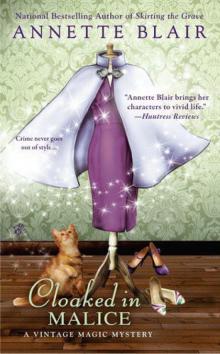 Cloaked in Malice
Cloaked in Malice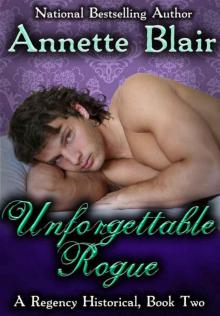 UNFORGETTABLE ROGUE (The Rogues Club, Book Two)
UNFORGETTABLE ROGUE (The Rogues Club, Book Two)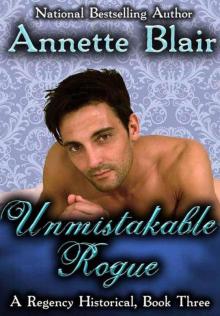 Unmistakable Rogue
Unmistakable Rogue Butterfly Garden
Butterfly Garden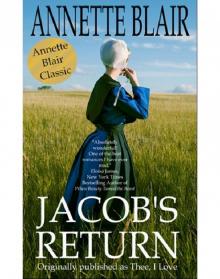 Jacob's Return
Jacob's Return Vampire Dragon
Vampire Dragon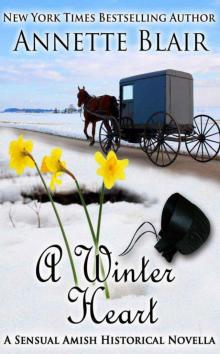 A Winter Heart, Sexy Amish Historical Novella
A Winter Heart, Sexy Amish Historical Novella Scandalous Brides
Scandalous Brides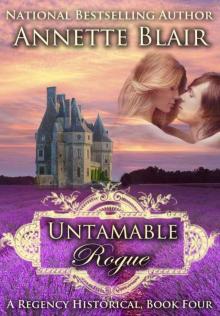 Untamable Rogue (Formerly: A Christmas Baby)
Untamable Rogue (Formerly: A Christmas Baby)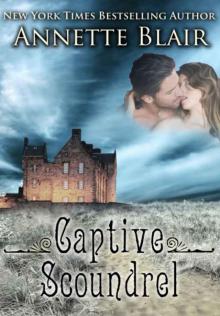 Captive Scoundrel
Captive Scoundrel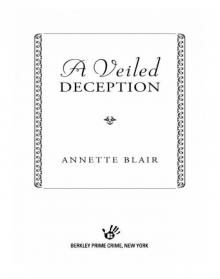 A Veiled Deception
A Veiled Deception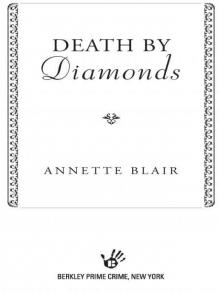 Death by Diamonds
Death by Diamonds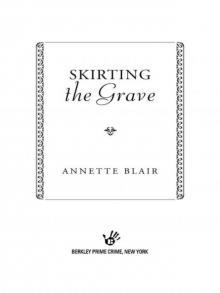 Skirting the Grave
Skirting the Grave Sex and the Psychic Witch
Sex and the Psychic Witch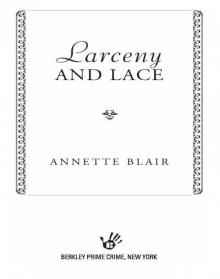 Larcency and Lace
Larcency and Lace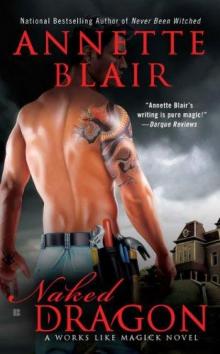 Naked Dragon
Naked Dragon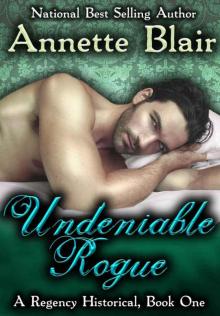 Undeniable Rogue (The Rogues Club Book One)
Undeniable Rogue (The Rogues Club Book One)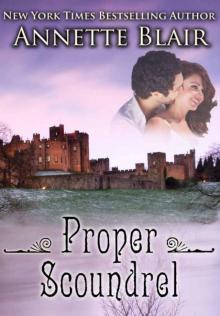 Proper Scoundrel
Proper Scoundrel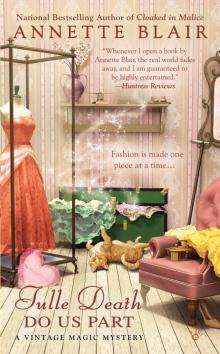 Tulle Death Do Us Part
Tulle Death Do Us Part